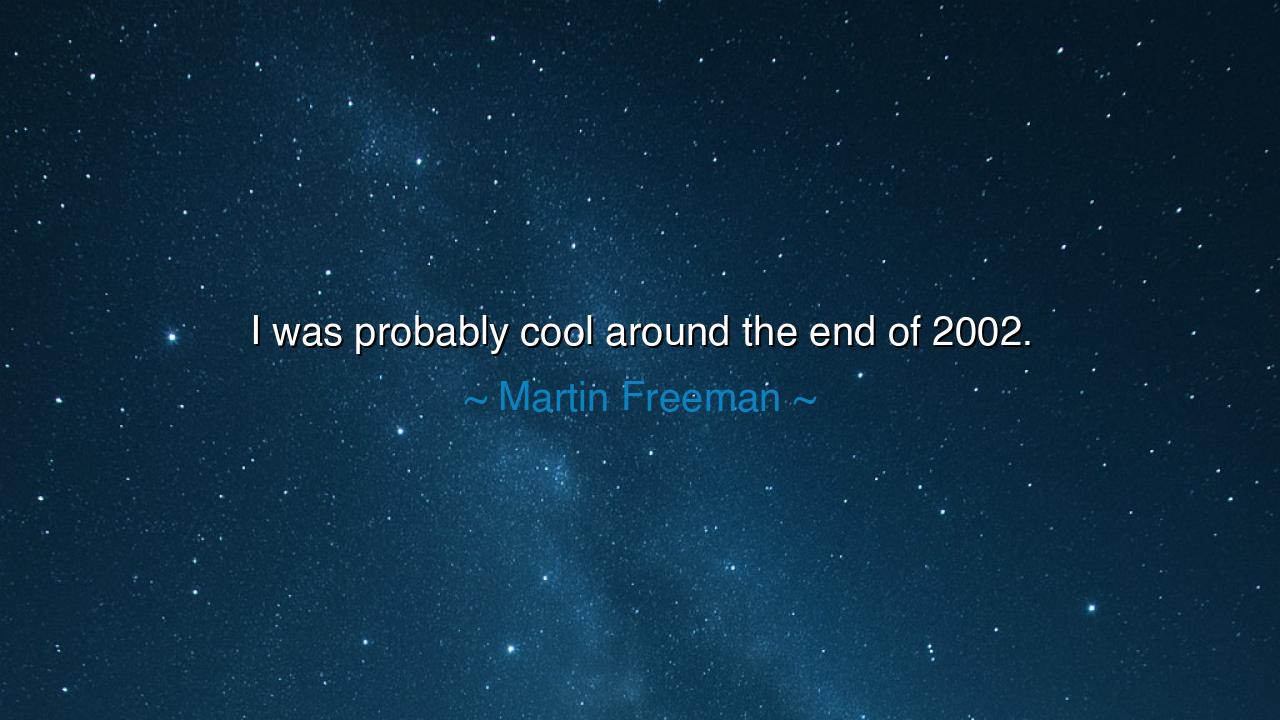
I was probably cool around the end of 2002.






In the quest for identity, there are moments in life when we look back and recognize a period of transformation, when we became something more than we were before. Martin Freeman’s words, “I was probably cool around the end of 2002,” reflect a humble admission that even greatness is not always instantaneous. It takes time, and it comes in waves—sometimes without our even realizing it. The notion of being “cool” is not just about an external perception, but about the inner growth that transforms us into something greater than we once were. Freeman, in this simple phrase, acknowledges the ebb and flow of personal development, the rise of one’s confidence over time, and the eventual realization that we have reached a certain moment of achievement.
The ancients understood the importance of timing and self-realization. Consider the tale of Hercules, the son of Zeus. Born with strength beyond measure, Hercules was destined for greatness, but it was not until he embarked upon his Twelve Labors that he truly came into his own. His path to greatness was not an instantaneous one—it was forged through struggle, through defeating the seemingly impossible, and through proving himself not only to others but to himself. Just as Freeman reflects on a specific period when he became “cool,” Hercules came to realize his greatness through his trials, each one a step on the journey to achieving his true potential.
Similarly, Socrates found his own coolness not in wealth or fame but in his unyielding pursuit of wisdom. He famously declared that “The unexamined life is not worth living.” Socrates understood that his legacy would be defined not by public opinion but by his commitment to understanding and teaching. Like Freeman, Socrates’s realization of his place in the world did not happen all at once, but through a steady accumulation of self-reflection, actions, and dialogue that changed not only the way he saw the world but the way the world saw him. To be truly “cool” in the eyes of others, as Freeman reflects, requires deep personal growth and a readiness to embrace one’s journey toward fulfillment.
In more modern times, the self-realization of an individual often occurs through the path of their craft. Consider the story of Steve Jobs, who, like Freeman, came into his own not in the early days of his career, but after years of hard work, failure, and refinement. The year 2001, when Apple introduced the iPod, marked a moment of breakthrough for Jobs, but it wasn’t until later, in the mid-2000s, that Jobs fully understood and embraced his place as a transformative figure in technology. His coolness, much like Freeman’s, was not immediately apparent—it grew and solidified over time, shaped by a vision that resonated deeply with the world.
What Freeman’s quote also reminds us of is the relativity of perception. The idea of being “cool” is ever-changing, often dictated by the trends of the time. What was cool in 2002 is not the same as what is considered cool today, just as what seemed important to us in our youth may seem less so as we grow older. The ancients understood this fluidity. Heraclitus taught that “everything flows,” reminding us that our sense of self and what we perceive as important is constantly in flux. Freeman’s reflection on being “cool” at a specific moment is not a statement of permanence but a recognition of how we evolve within the larger current of time.
The lesson here is simple but powerful: self-realization is a journey that unfolds over time. Just as Freeman reflects on his moment of coolness, we too must recognize that the paths we walk today, the challenges we face, and the efforts we put forth will eventually lead us to moments of growth. These moments are not always sudden or obvious, but they are part of the ongoing process of becoming who we are meant to be. In embracing this, we free ourselves from the need for external validation and find confidence in knowing that our value grows over time as we continue to strive for personal excellence.
In practical terms, this means that we should not rush or force our growth. Like Freeman, who reflects on his personal development in a humble and grounded way, we too must allow ourselves the time to evolve. Whether in work, relationships, or personal goals, growth comes gradually. Patience, dedication, and an openness to learning from our mistakes and experiences are the true keys to achieving the moments of realization that shape our identity. So, let us remember that being “cool” is not about meeting society’s immediate standards, but about being true to ourselves and embracing the journey of becoming.






AAdministratorAdministrator
Welcome, honored guests. Please leave a comment, we will respond soon